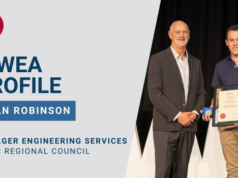Retirement might be just around the corner for John Comrie, but he’s not quite ready to pull up stumps on a successful career that has spanned three decades and all levels of government.
Far from winding the clock down, Comrie is currently midway through a review of the financial affairs of the District Council of Coober Pedy, 850 kilometres north of Adelaide, on behalf of the South Australian Government.
In 2019, the council was suspended after a damning Ombudsman’s report found evidence of maladministration. “I’m having a look at its finances, its forward plans, its circumstances, and what, if anything, needs to change,” says Comrie.
Fostering good financial management in local government has been a guiding light in Comrie’s career.
After studying economics and accounting at university, Comrie’s career began in the Commonwealth Government, where he worked in the Postmaster General’s department. He then took a role at the state government run water authority, where he first became interested in asset management.
Local government beckoned, and Comrie joined the District Council of Noarlunga in outer-metropolitan Adelaide (now part of the City of Onkaparinga after amalgamation in 1997). Comrie “looked after the admin and finance side of things,” eventually rising to the role of council CEO.
Next, Comrie joined the LGA of South Australia as CEO before moving on to take up the leadership of the South Australian Government’s Office of Local Government – “the state department that advises the state government and oversees local government legislation,” Comrie explains.
For the last 15 years, Comrie has served as a consultant for organisations including IPWEA, Deloitte Access Economics, and the Australian Centre of Excellence for Local Government, delivering education and training courses and working on projects such as the Coober Pedy council review.
He has also experienced local government as an elected member, serving four years as a local councillor during the time he worked for the South Australia State Government.
In local government, Comrie says, “It’s easier to make a difference. If you’re involved in senior management, you can influence the elected council, and you can see the successes or failures of your actions far more than you can in state or commonwealth government.”
Comrie is one of the speakers set to appear at the International Public Works Conference (IPWC), to be held from May 1 to 5 in Adelaide.
On Comrie’s agenda at IPWC is how councils can make better use of debt. “Too many councils are too debt-averse,” he says. “Many councils believe they have financial challenges, and they often do, but with good planning – including greater and better use of debt – they often can get over those hiccups. If we’ve got some roads or bridges that are falling apart, maybe we can borrow some money and pay it off over time.”
He will also speak about the necessity for finance and asset management teams to work in harmony. “They need to have a common agreement about asset values, about the remaining useful life of assets and about the rate of consumption of those assets – whether they’re going to wear out and what the annual level of consumption is of those assets. With that data, they can then work out what is an affordable level of service in the longer term and plan accordingly.”
Too often, he says, the differing perspectives of finance and asset management departments are never reconciled. “They stay in their corners,” says Comrie. “The engineer says, we need to spend ‘X’, and the finance person says we haven’t got the money. They need to work together better.”
Another challenge for the industry is to better inform elected councils and the community about the management of their assets and “the implications of spending money – or not spending money. People too often take a short-term view,” Comrie says.
“I’ve enjoyed working with IPWEA over the last 15 years because it’s been on the same page. The IPWEA guidelines, the IPWEA instruction manuals, the IPWEA training courses have tried to do the same thing – help people understand those messages. Not only understand them but give them the confidence to be able to go back to their council and sell that message to others.”














